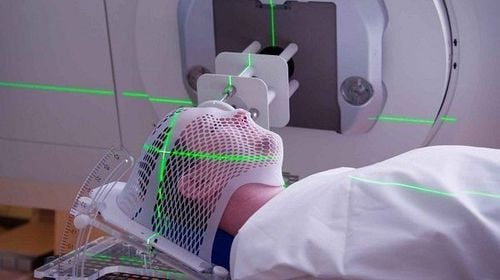This is an automatically translated article.
The article was written by BSCKII Do Thi Ngoc Hieu - Head of Radiology Department, Department of Diagnostic Imaging - Vinmec Central Park International General HospitalBrain MRI can be helpful in evaluating other problems such as persistent headaches, dizziness, muscle weakness or paralysis, impaired vision (blurred vision) or seizures, and it can help detect chronic diseases. nervous system properties, such as multiple sclerosis or multiple sclerosis.
1. Who should be assigned brain magnetic resonance imaging
Brain magnetic resonance is a technique that can be applied to almost all subjects, including pregnant women, children... However, this technique should be used with caution when indicated in the following subjects: people with metal devices, patients with glomerular filtration rate <30ml/min.Cranial magnetic resonance is the method of choice to diagnose many diseases or abnormalities related to brain parenchyma - meninges, cerebral blood vessels, soft tissues - skull. Specifically indicated cases:
Children with mental retardation - motor suspected brain abnormalities. Seizures (convulsions). Meningeal triad: Headache, vomiting unrelated to food, constipation. Dizziness needs to find the underlying cause. Prolonged headache requires brain magnetic resonance imaging to find the underlying cause There are vision, language, motor, sensory disorders Memory impairment Abnormalities of the senses: disturbances in vision, hearing, smell, taste... Endocrine abnormalities suspected of pituitary origin Screening for vascular malformations In case of trauma + Pregnant women and children should consider magnetic resonance imaging
+Computerized tomography scan explain all clinical signs, need to appoint magnetic resonance.
+ Find sequelae of traumatic brain injury.
In cases where it is necessary to evaluate the functional anatomy of the brain such as in the case of evaluating the effects of stroke, trauma, degenerative brain disease on the function of each region of the brain. Monitor brain tumor growth and function. Guidelines for treatment planning, radiotherapy or other invasive brain treatments.

Chụp cộng hưởng từ não được chỉ định cho những đối tượng khác nhau
2. What can the scan results tell about your medical condition?
Cranial magnetic resonance imaging uses magnetic fields, radio waves and computers to create detailed images of brain parenchyma, soft tissue, and skull bones, thereby diagnosing abnormalities and diseases of the brain. Specifically, there are the following abnormalities:Congenital abnormalities. Hydrocephalus – dilation of the ventricular system. Seizures (convulsions). Infection. Stroke. Brain tumors. Certain chronic diseases, such as multiple sclerosis. Hemorrhage in trauma patients. Injury to the eye and inner ear. Damage to the pituitary gland. Blood vessel problems, such as an aneurysm, blocked artery (blockage), or venous thrombosis (blood clot in a vein).

Chụp cộng hưởng từ sọ não giúp chẩn đoán nhiều bệnh lý
3. How long are magnetic resonance results valid?
The results of cranial magnetic resonance imaging reflect the image of the brain at the time of the survey. Therefore, depending on the case, the doctor will decide the time to repeat the scan to assess the progress of the disease.Vinmec International General Hospital is currently one of the major hospitals with modern machinery and equipment for general medical examination and treatment procedures and accurate and modern MRI for brain and vascular diseases. brain blood in particular.
Especially, Vinmec International General Hospital is the first unit in Southeast Asia to put into use the new 3.0 Tesla Silent MRI machine from the US manufacturer GE Healthcare.
The machine currently applies the safest and most accurate magnetic resonance imaging technology available today, without using X-rays, non-invasively. Silent technology is very beneficial for patients who are young children, the elderly, patients with weak health or have just had surgery.
Customers can directly go to Vinmec Health system nationwide to visit or contact the hotline here for support.
MORE:
When do you need a magnetic resonance imaging (MRI) scan? Diagnosing meningiomas by magnetic resonance (MRI) When is a full-body magnetic resonance imaging (MRI) required?













